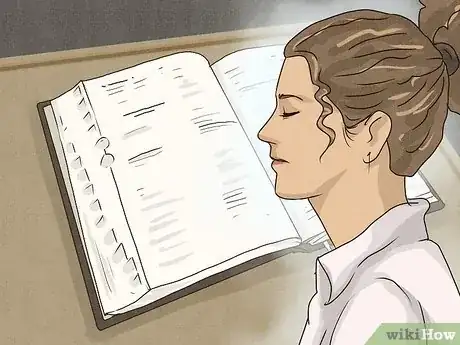This article was co-authored by wikiHow staff writer, Hannah Madden. Hannah Madden is a writer, editor, and artist currently living in Portland, Oregon. In 2018, she graduated from Portland State University with a B.S. in Environmental Studies. Hannah enjoys writing articles about conservation, sustainability, and eco-friendly products. When she isn’t writing, you can find Hannah working on hand embroidery projects and listening to music.
This article has been viewed 11,473 times.
Learn more...
If you’ve ever looked up how to lower your stress levels, you’ve probably stumbled across meditation and how to do it. Since meditation is usually associated with new age practices, it can bring about some questions: is meditation a sin? How, exactly, can Christians meditate while keeping their faith? In this article, we’ll tell you everything you need to know about meditation and whether or not it can coexist with religious beliefs.
Things You Should Know
- Meditation is not a sin in Christianity. In fact, many Christians use meditation as a way to clear their minds and feel closer to God.
- It does not go against God or religion to meditate, as long as you aren’t trying to empty your mind completely.
- Meditation is mentioned multiple times throughout the Bible, and is even recommended as a way to bring peace and clarity.
Steps
How do you practice biblical meditation?
-
1Read a short passage of scripture. You can choose any part of the Bible that you’d like: maybe one that touches on meditation specifically, or one that your church leaders have been talking about. Take the time to read it to yourself, either out loud or in your head, a couple of times.[6]
-
2Sit in silence and relax your body. Pick a comfortable position that you don’t mind staying in for a while. Eliminate distractions, like your phone or the TV. Try to sit in complete and total silence for around 10 minutes, then ask God in your mind to guide your meditation.[7]
-
3Ruminate on the passage you have read. Clear your mind of other thoughts so you can focus on the scripture. Try making connections from the passage you read to your own life, or to other passages in the Bible. Ask God to give you guidance and help you examine your feelings.[8]
- Some Christians choose to write these thoughts down, while others keep them to themselves. You can do whichever one speaks to you most.
-
4Pray to God. As you wrap up your meditation session, give a final prayer of thanks to God. Use the passage as your guidance, and read the passage as you pray, responding to God after each verse.[9]
References
- ↑ https://www.jw.org/en/library/magazines/g201405/meditation/
- ↑ https://my.clevelandclinic.org/health/articles/17906-meditation
- ↑ https://www.jw.org/en/library/magazines/g201405/meditation/
- ↑ https://my.clevelandclinic.org/health/articles/17906-meditation
- ↑ https://www.gotquestions.org/biblical-meditation.html
- ↑ https://www.cslewisinstitute.org/resources/biblical-meditation/
- ↑ https://www.cslewisinstitute.org/resources/biblical-meditation/
- ↑ https://www.cslewisinstitute.org/resources/biblical-meditation/
- ↑ https://www.cslewisinstitute.org/resources/biblical-meditation/




































































